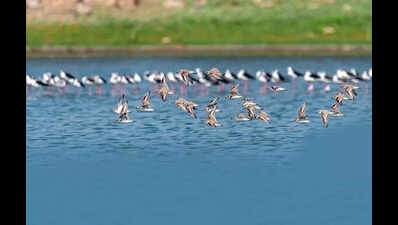Hyderabad: In a significant move to understand and conserve the city’s urban biodiversity, the World Wide Fund for Nature (WWF), in collaboration with Hyderabad Birding Pals and Deccan Birders, is curating a Bird Atlas. This citizen-driven initiative aims to systematically map the distribution of bird species across Hyderabad and its surroundings, creating a vital database to support conservation efforts. The project brings together birdwatchers, researchers, and citizen scientists in a collective effort.
“Participants will conduct bird surveys twice a year—once in winter (February) and once in summer (July)—over a span of three years. These surveys will cover diverse habitats within the Outer Ring Road, including woodlands, grasslands, wetlands, open natural ecosystems, and urban areas. By collecting detailed data on bird presence, abundance, and breeding status, the project will offer a comprehensive picture of Hyderabad’s avian life,” explained Farida Tampal from WWF.
She added that the Hyderabad Bird Atlas follows the bird atlases in Coimbatore, Mysuru, and Kerala, with the goal of replicating their impact in India’s expanding urban centres. “Bird atlases are invaluable tools for scientists, conservationists, and policymakers. They help monitor changes in bird populations and identify key habitats such as breeding grounds, migration stopovers, and wintering sites. This data can reveal important trends—like population declines or shifts in migratory patterns—that serve as indicators of habitat quality, climate change, and other environmental shifts,” said Sriram Reddy from Hyderabad Birding Pals.
Reddy also highlighted that the Bird Atlas will play a vital role in land-use planning and urban development. “By identifying biodiversity hotspots, the atlas can inform urban development decisions, ensuring that human activity minimizes its impact on bird habitats. Documenting the fine-scale distribution of birds and tracking changes over time will help conservationists design targeted strategies to protect critical habitats,” he added.
Sudhir Moorti K from Deccan Birders emphasized the importance of the project in assessing the impact of urbanisation on bird populations. “The atlas will provide insights into how urbanisation is affecting bird species and help predict how future human activities may influence them.”
“Enthusiastic birdwatchers and volunteers will be key to conducting surveys and collecting data. Similar projects in Coimbatore and Mysuru have proven the power of community-led initiatives to create detailed bird distribution maps, while the ongoing Kerala Bird Atlas is considered one of the most comprehensive avian studies in India,” Sudhir added.
MSID:: 115774582 413 |








